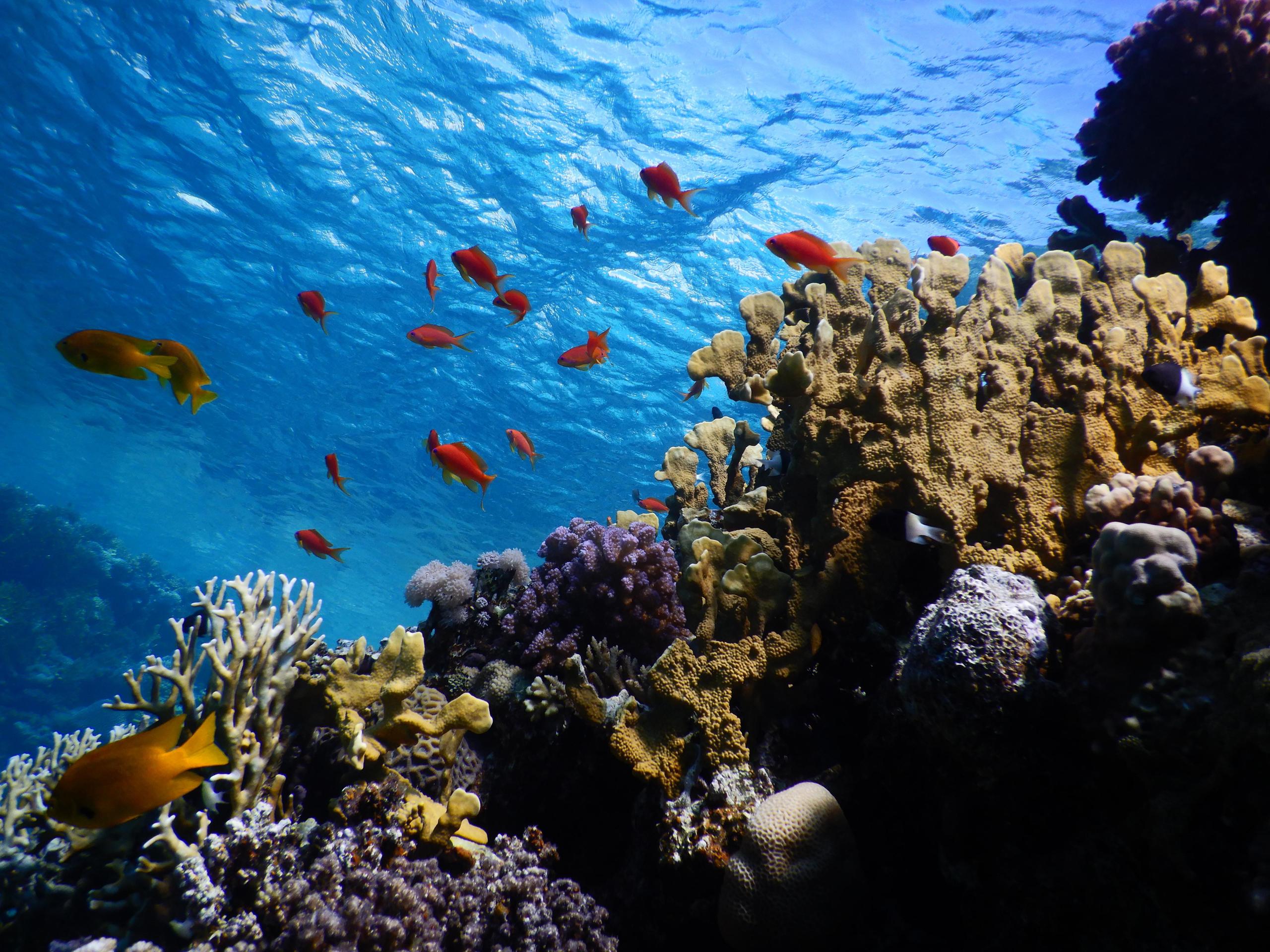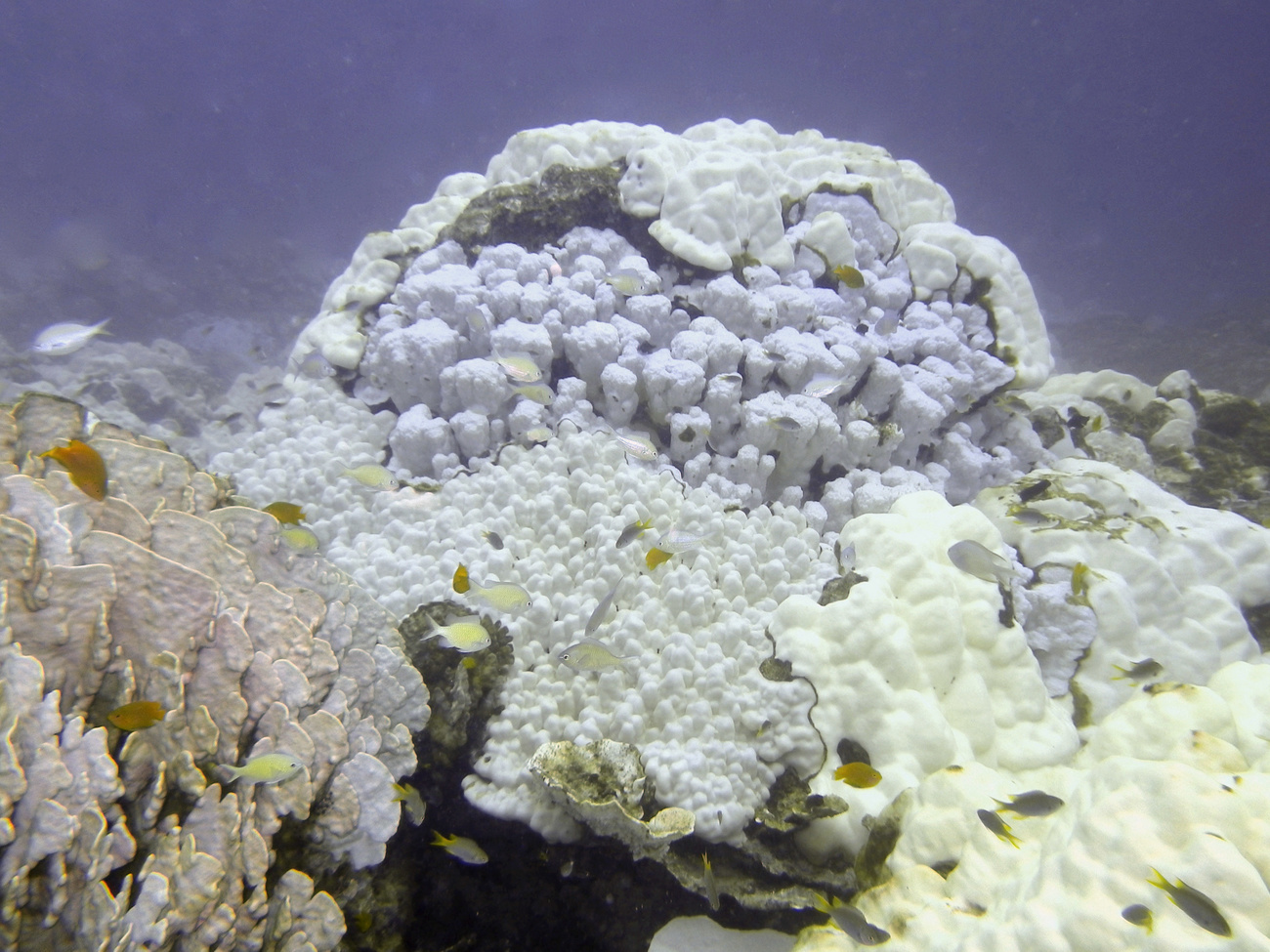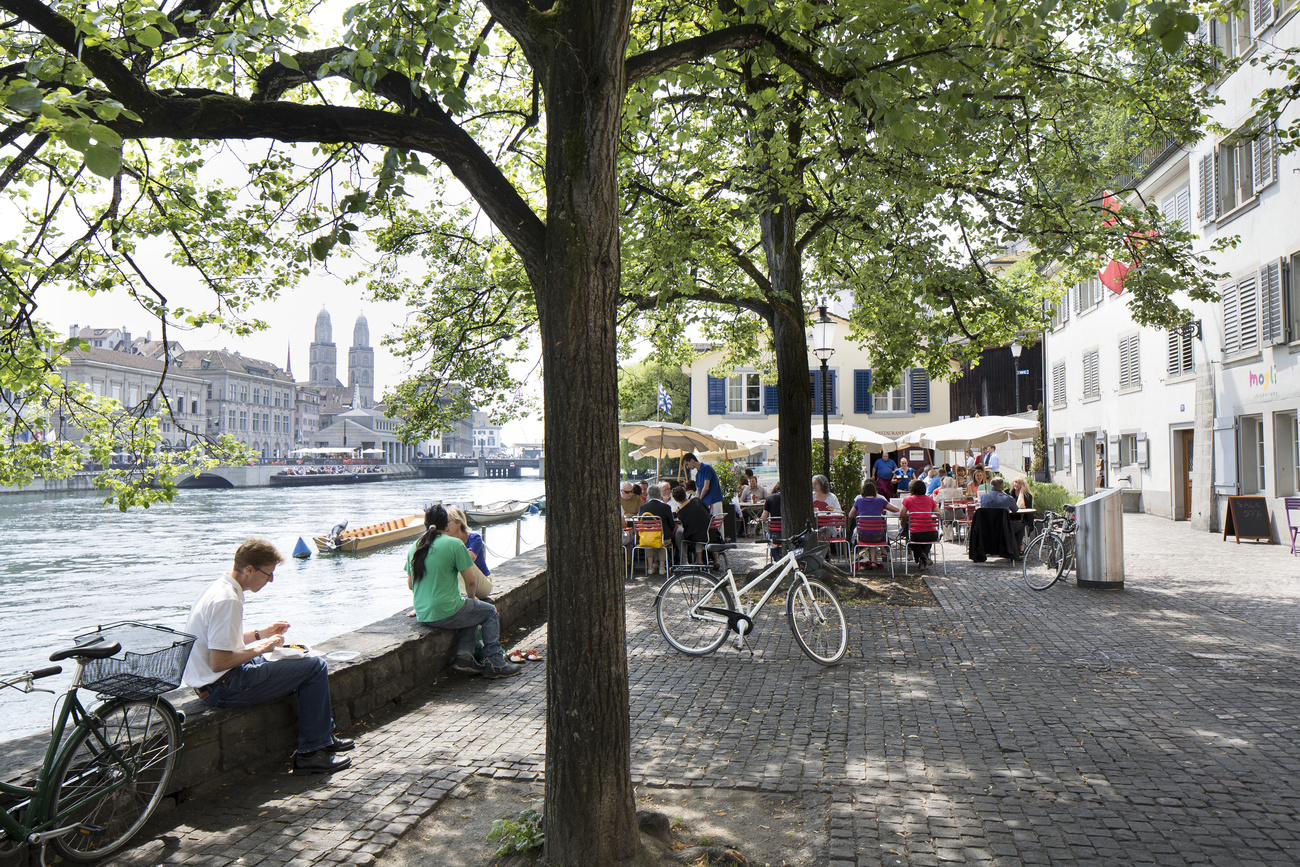Diplomatic ecosystem aims to save Red Sea corals

Biochemists studying Red Sea corals, which are particularly resilient to global warming, recently completed an expedition to Djibouti in eastern Africa. The mission, led by researchers in Lausanne, is emblematic of Swiss efforts in scientific diplomacy.
When Charles Darwin first arrived in the Galapagos Islands in 1835 and observed the coral reefs, he was faced with what he considered a “paradox”. Such crystal-clear waters were, in his eyes, a synonym for nutrient poverty. “How, then, is such a teeming of life possible?” he presumably wondered wryly as he stroked his long beard.
What the British naturalist did not know is that corals have a superpower: despite belonging to the animal kingdom, they are capable of photosynthesis. Or rather, zooxanthellae, single-celled algae that live in the tissues of coral polyps giving them colour and nourishment, are capable of it.
Zooxanthellae are the gateway into the marine ecosystem of solar energy, a force they use to produce oxygen, mucus and other organic compounds that enable the growth of bacteria. These bacteria are eaten by more complex life forms, themselves food for higher organisms and so on. In addition, the characteristic shape of corals provides shelter and habitat for a variety of species.
All this makes coral reefs one of the most biodiverse ecosystems on the planet, comparable in this respect to rainforests.
The Red Sea reef is of particular interest, said biochemist Anders Meibom, because it may be the only one still alive at the end of the century. In late September he returned to the Swiss Federal Institute of Technology Lausanne (EPFL) after a two-week expedition to the Gulf of Tadjoura, in Djibouti. It was the most recent step in a series of missions to study coral reefs with researchers in the region. Although global warming poses one of the greatest threats to these ecosystems, Meibom is optimistic for the Red Sea reefs.
An increase in water temperature of about 2°C, for example during a prolonged heat wave, breaks the symbiosis between the corals’ polyps and algae. When the corals become stressed, they expel the algae and bleach. This puts them at risk of starvation, diseases and ultimately death. It is a phenomenon now observed in most coral reefs around the world, but exceptionally little in the Red Sea. Indeed, in the northern part of this sea the corals do not bleach even when subjected to a 5°C increase in water temperatureExternal link.

More
Swiss scientific diplomacy sets sail to save corals
Meibom said that this resilience is due to the fact that corals, over thousands of years, have spread across the Red Sea from the south towards the north, all the way to the Gulf of Aqaba, where their particular thermal resilience was first noted a decade agoExternal link.
“The further north you move in the Red Sea system, the colder the water gets, but in the biology of the corals that live there remains a memory of living in much warmer conditions, such as those that characterise the southern part of the Red Sea,” he explained.
Reef relief
The September expedition brought positive news: there is no evidence of bleaching among the corals in the Gulf of Tadjoura, in Djibouti, despite being in an area where the average water temperature is higher than in the northern Red Sea.
“Even in Djibouti, the water temperature has risen by one or two degrees over the past centuries. The fact that corals are still not suffering is wonderful and a great relief,” says Meibom, who describes the corals in this corner of the sea as “the fathers and mothers of all corals in the Red Sea”. Studying their biology to understand what makes them so heat-resistant is therefore very important.
Also critical is understanding the workings of the coral ecosystem across the entire Red Sea, which is ultimately the goal of the Transnational Red Sea Center (TRSC), an EPFL research centre founded in 2019 and headed by Meibom.
The TRSC project is the first of this scale to have cutting-edge technology in genetic analysis and 3D mapping, and to make the data available to all according to the principles of open science. The data will be of particular use to countries surrounding the Red Sea in deciding on the best actions to take to protect the coral reefs on their coasts from threats such as pollution, intensive fishing and mass tourism.

Meibom hopes the high quality of the data will convince other states to participate in the project, particularly Egypt, a country that has about 1,500km of Red Sea coastline (out of a total of 4,500km) and where the United Nations Climate Change Conference (COP27) will be held from November 6-18.
‘Beautiful gift’
At the ecological level, the Red Sea is a unique and closely interconnected system, but the same cannot be said at the geopolitical level. Many of the countries in the region are politically unstable, and even more complicated are the relationships among these states.
The TRSC mission therefore also requires diplomatic work to succeed, carried out by the Swiss foreign ministry as part of its scientific diplomacy strategy (see box). Jordan, Israel, Sudan and Djibouti are currently participating in the project. “The Swiss ambassadors in the region and the contacts they make are fantastic,” Meibom said.
His enthusiasm is reflected in the words of the Swiss ambassador to Djibouti, Pietro Mona. “When I heard about the project, I said to myself: as ambassador, this is just a really beautiful gift,” he said. “It responds to the interests that the country’s president [Ismail Omar Guelleh] has indicated to me as a priority and allows us to open new avenues of cooperation.”
Science diplomacy Switzerland’s foreign policy interests. International scientific cooperation promotes international, multilateral and bilateral relations. Because science is neutral and apolitical, it can help strengthen relations between states. The foreign ministry is careful to take available scientific evidence into account in its diplomatic activities, particularly at the multilateral level. Against this backdrop, the foreign ministry also supports platform projects aimed at strengthening International Geneva. One example is the Geneva Science and Diplomacy Anticipator (GESDA), which was founded in 2019. The foundation’s goal is to use scientific and technological progress to develop solutions to current and emerging challenges facing humanity. (Source: Swiss foreign ministryExternal link)
In March, the Swiss government decided to fund the foundation with another CHF3 million ($3 million) a year until 2032.
TRSC’s coral project was among the highlights of last year’s GESDA summit. The 2022 summit is held in Geneva from October 12-14.
Djibouti is a stable state in the Horn of Africa with an authoritarian government. It has ambitions to profile itself in the protection of the environment, corals in particular. A long-term collaboration between Djiboutian ministries, universities and research centres with an internationally prestigious institute such as EPFL is therefore beneficial.
The preservation of coral reefs is also of huge economic importance in many Red Sea countries because of revenues from tourism. This sector in Djibouti currently accounts for only 3% of GDP, but the country intends to develop it further, including through cooperation with Switzerland, Mona said.
Not altruistic
The foreign ministry’s commitment is not altruistic. Good relations with Red Sea countries and stability in the region are important to Switzerland.
“Scientific diplomacy projects reinforce our country’s visibility, but above all, the bilateral relations we need in a wide variety of contexts,” Mona said, giving the example of Switzerland joining the UN Security Council in June 2022. But it is also important for the goals of economic and sustainable development.
The collaboration in Djibouti therefore appears emblematic of the virtuous circle of science diplomacy. Just as zooxanthellae act as an access point for sunlight in the coral reef, so science, in principle neutral and apolitical, opens opens the door to diplomatic dialogue, which in turn creates the framework conditions for research to continue. An ecosystem of multilateral relations invaluable in aiming to address addressing major global challenges like climate change and biodiversity loss.
Edited by Sabrina Weiss

More
‘Scientific diplomacy is a must, not a fad’

In compliance with the JTI standards
More: SWI swissinfo.ch certified by the Journalism Trust Initiative












You can find an overview of ongoing debates with our journalists here . Please join us!
If you want to start a conversation about a topic raised in this article or want to report factual errors, email us at english@swissinfo.ch.